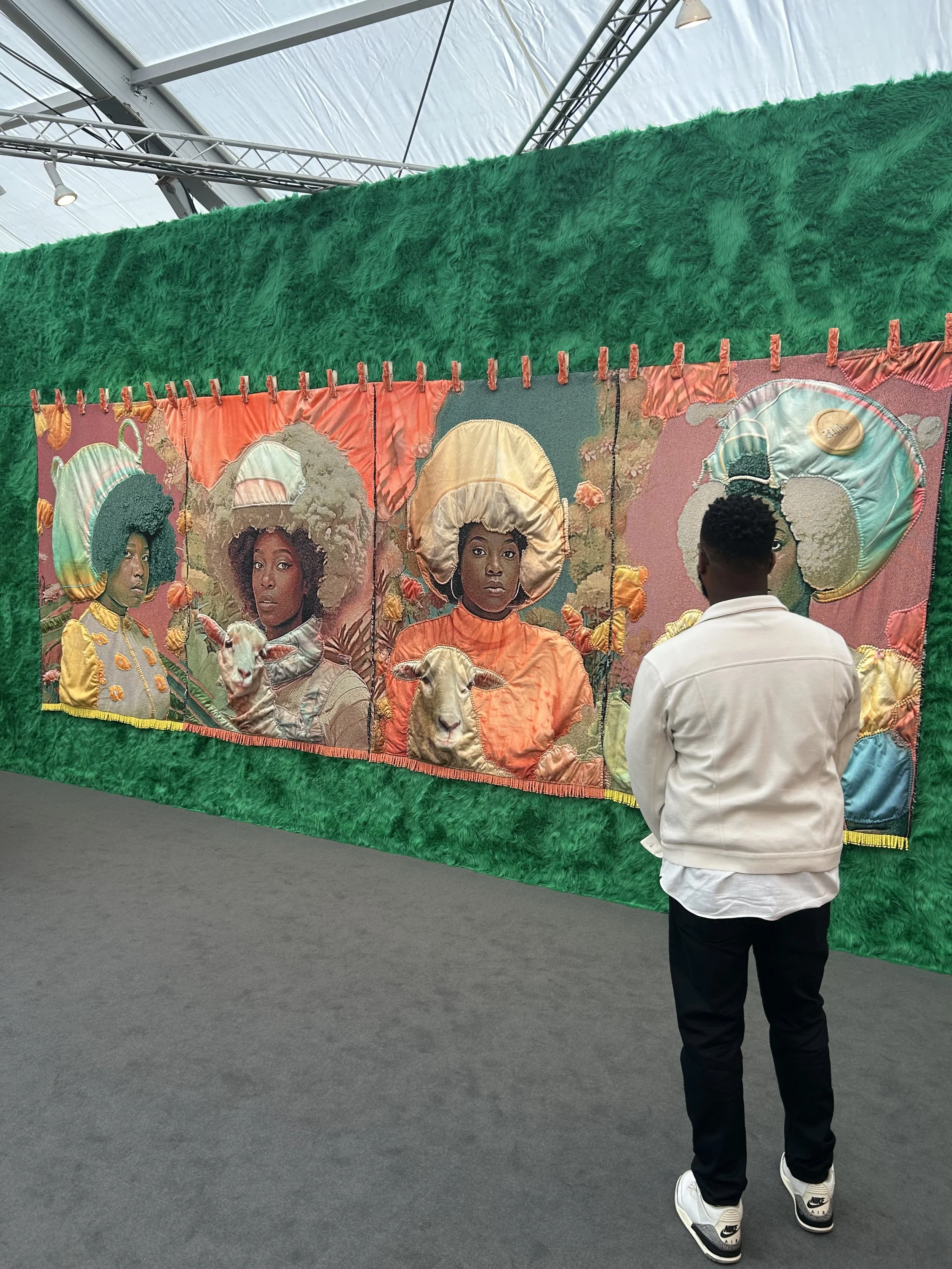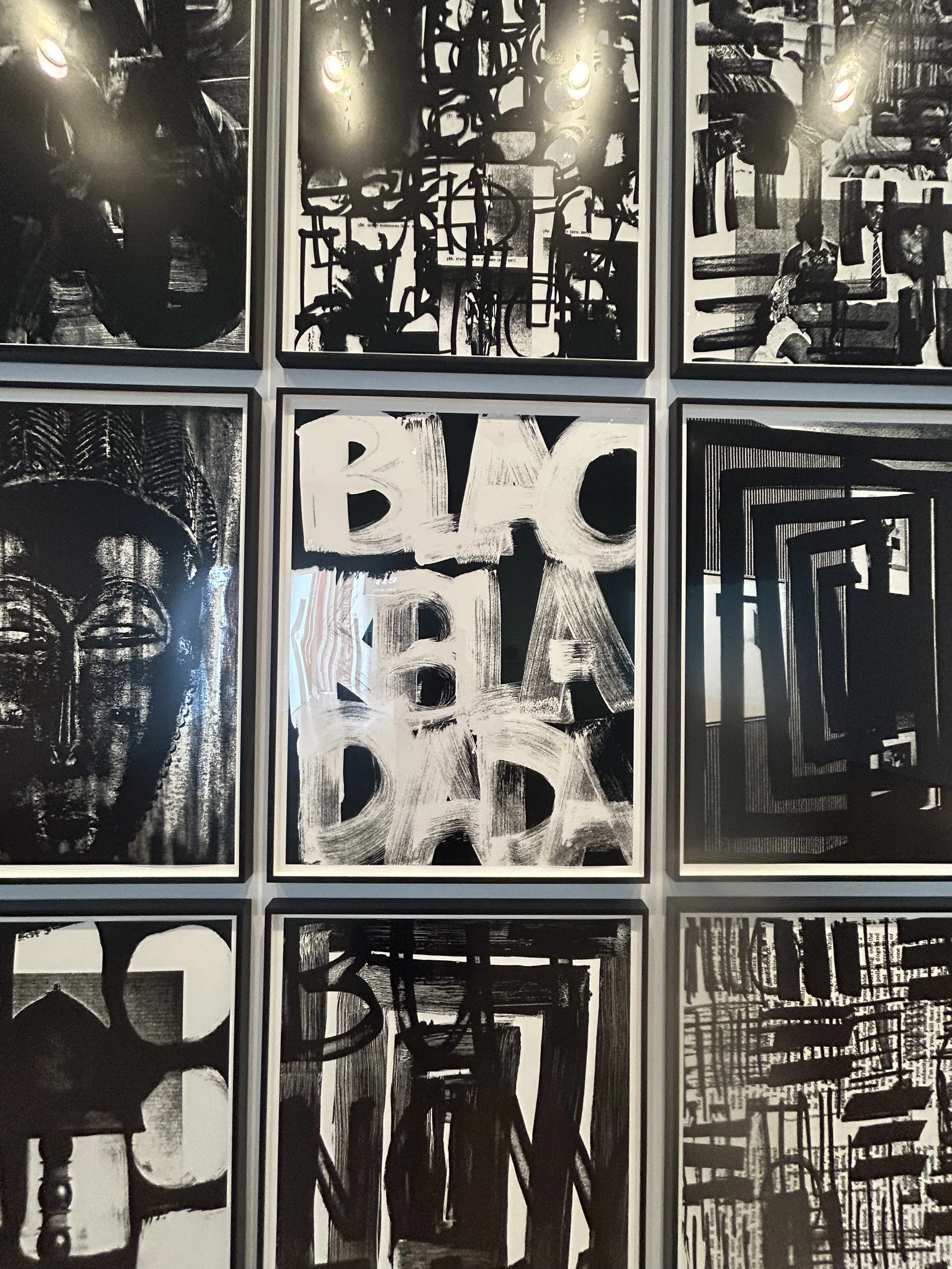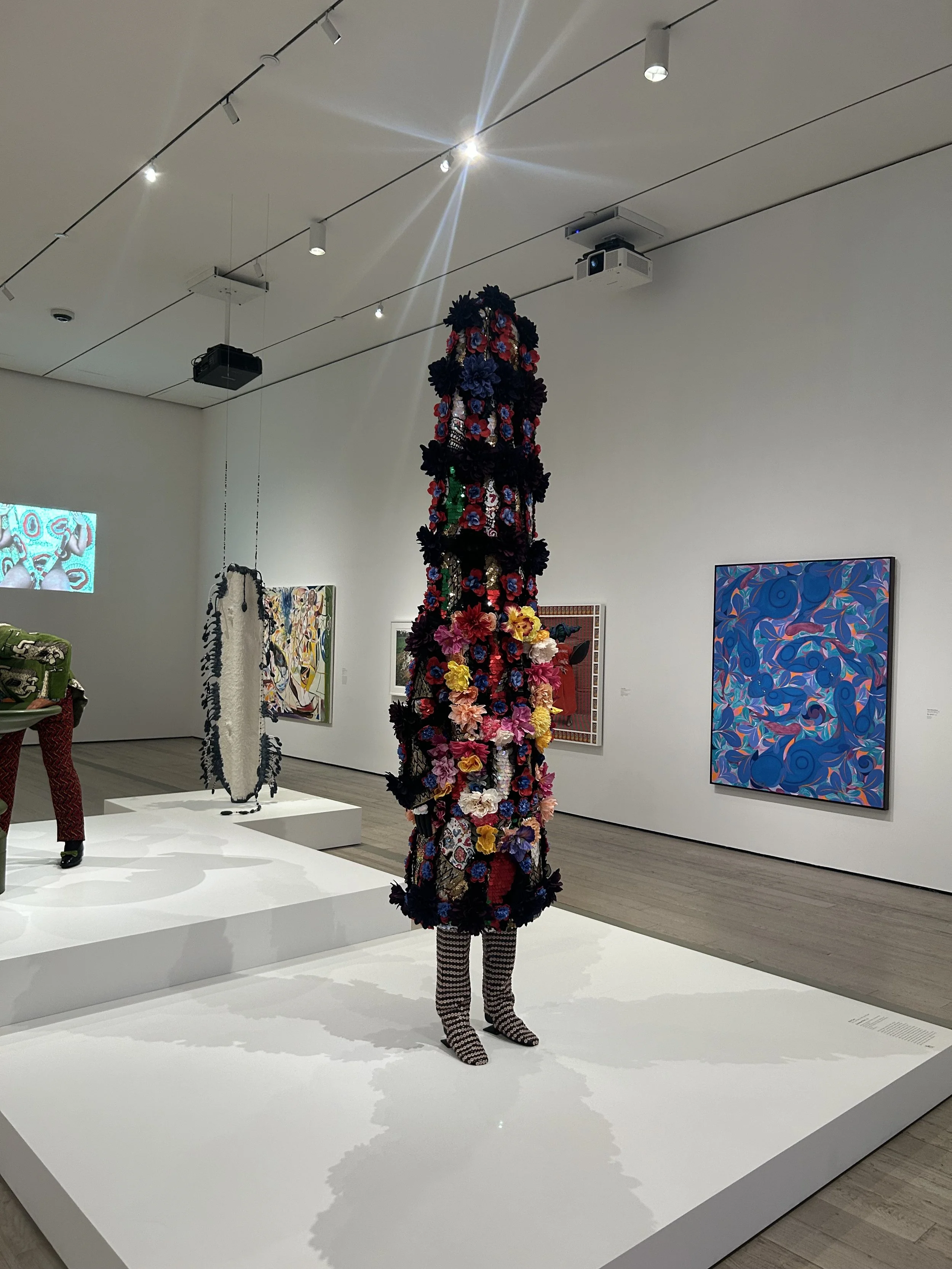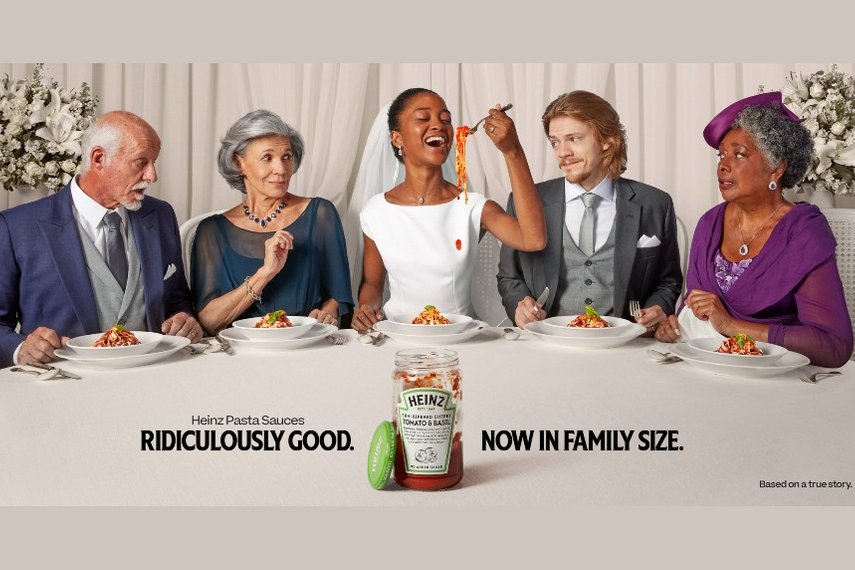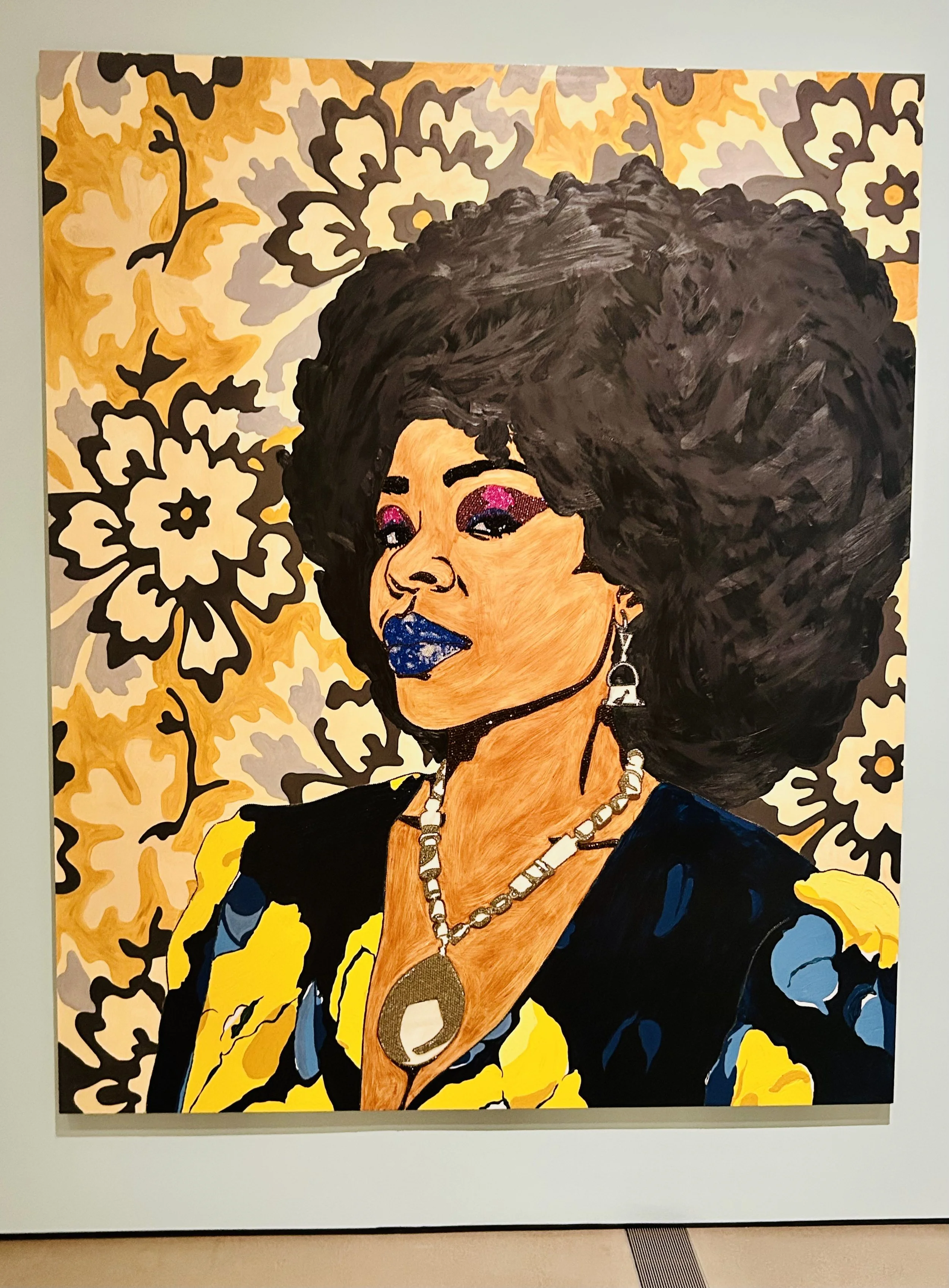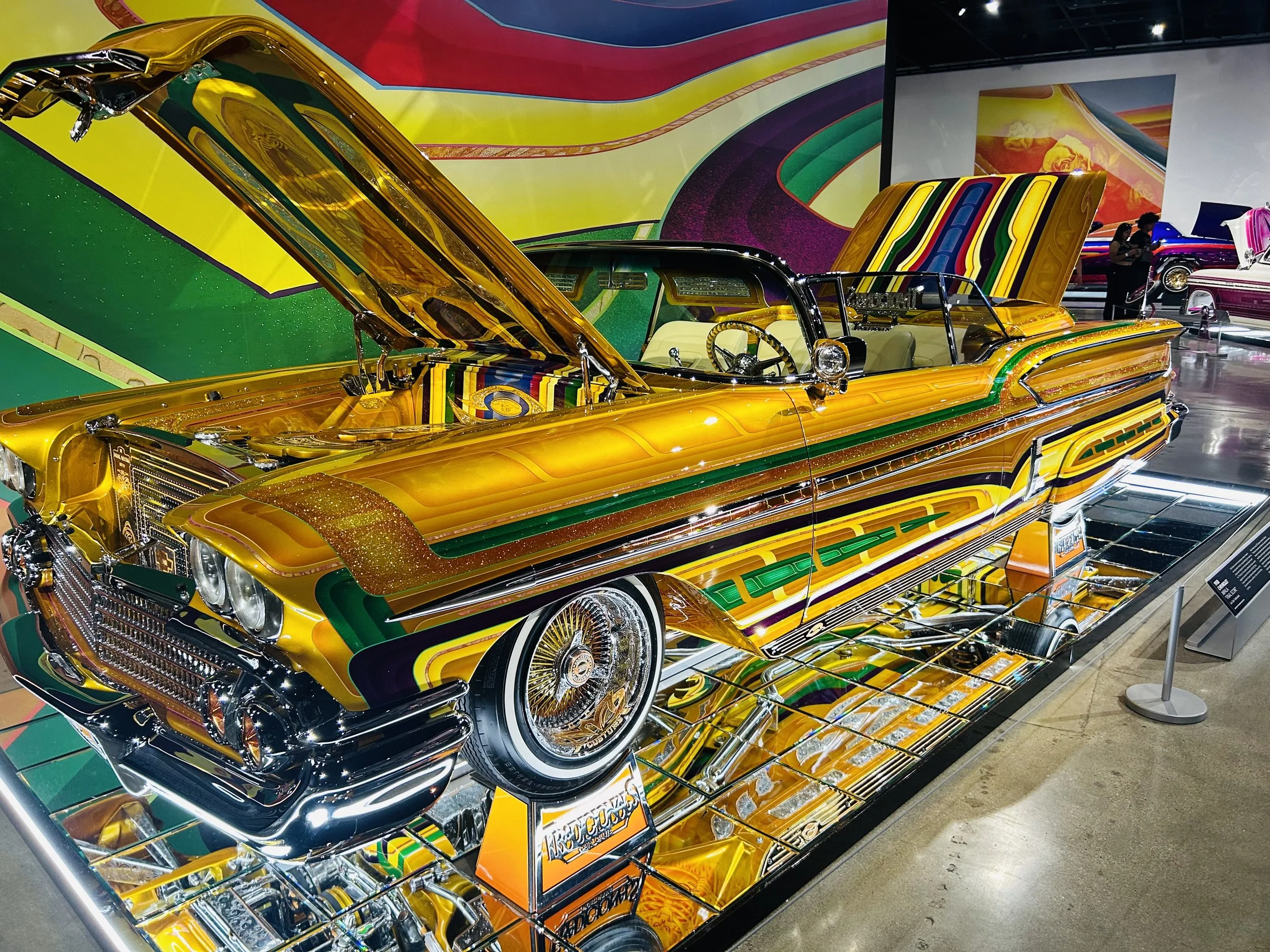Field Notes: MOCA’s “Ordinary People: Photorealism and the Work of Art since 1968 “
Welcome to Field Notes, a NOMMO blog series that reviews exhibitions focused on Black history, art, and culture. Field notes record a researcher's observations and insights from their fieldwork. Our notes highlight recent African/Diasporic experiences in museums to promote accessibility for all.
MOCA’s latest exhibition, Ordinary People: Photorealism and the Work of Art since 1968, reexamines photorealism while centering powerful Black portraiture. Featuring artists like Kehinde Wiley, Amy Sherald, and Barkley Hendricks, the show highlights the presence and agency of Black figures in a movement often associated with technical precision over cultural critique.
Wiley’s regal compositions, Sherald’s muted yet emotionally rich tones, and Hendricks’ hyperreal depictions of everyday Black life challenge art historical conventions. These works are more than stunning representations—they are radical acts of visibility in a museum landscape that has historically omitted Black subjects.
Their photorealist techniques bring nuance to Black identity, asserting space and reshaping narratives around portraiture. Each brushstroke resists erasure, demanding recognition of Black life not as spectacle but as a vital and complex reality.
Beyond their technical mastery, these artists elevate everyday Black existence, turning familiar moments into commanding statements. Whether through Sherald’s contemplative figures or Hendricks’ casual yet arresting poses, their work reframes photorealism as an evolving language of representation, resistance, and reclamation.
Ordinary People challenges us to reconsider who is seen, how they are depicted, and why it matters. It is a necessary reminder that the everyday is political—and in the hands of these artists, it becomes unforgettable of the human experience.
Field Notes: Frieze 2025
Welcome to Field Notes, a NOMMO blog series that reviews exhibitions focused on Black history, art, and culture. Field notes record a researcher's observations and insights from their fieldwork. Our notes highlight recent African/Diasporic experiences in museums to promote accessibility for all.
For Black History Month, NOMMO’s team, founded by Tyree Boyd-Pates and accompanied by UCLA Art History artist Robert Young, had the honor of attending the VIP opening of Frieze Week 2025 at the Santa Monica Airport. As one of the most prestigious art fairs in the country, Frieze brought together leading figures from across the art world for an immersive and thought-provoking experience.
This year, Frieze Los Angeles showcased over 100 galleries from around the globe, offering a dynamic program that featured site-specific artworks, performances, and installations. Beyond the visual spectacle, the fair reinforced its commitment to community engagement by partnering with nonprofits to support grassroots projects and fundraising initiatives. Notably, Frieze also presented prestigious honors, including the Deutsche Bank Frieze Los Angeles Film Award and the Frieze Impact Prize. A specially curated section by Essence Harden highlighted solo exhibitions from U.S.-based galleries, amplifying fresh and critical artistic voices. To complement the experience, attendees enjoyed pop-up dining from some of Los Angeles' most celebrated restaurants.
Among the standout booths were David Zwirner, Superposition, Vielmetter, Dominique Gallery, and Ochi, each presenting a compelling vision of the evolving art landscape. One booth that spoke to the African Diaspora and NOMMO, the most captivating installations, came from April Bey’s exhibition with Vielmetter Los Angeles.
April Bey’s Atlantica: A Universe of Its Own
Bey’s immersive, mixed-media works stem from her ongoing Atlantica series—a visionary alternate universe where glitter is currency, and travelers pass through plant portals. Inspired by a conversation with her father, who used the language of science fiction to describe the Black experience, Atlantica serves as a radical reimagining of identity, resilience, and liberation.
Bey’s installation at Frieze enveloped viewers in fur-covered walls, intricately woven tapestries, and exuberantly embellished wall works. With elements of fantasy, Afrofuturism, Afrosurrealism, and post-colonial critique, her work reclaims the aesthetics of excess—glitter, beads, and textiles—to honor and uplift the figures within her community. In Atlantica, queerness flourishes unapologetically, and resistance is embedded in softness and adornment.
A Celebration of Art and Community
Beyond Bey’s striking presentation, Frieze Week also featured Lauren Halsey’s SummaEveryThang pop-up, which brought an incredible energy to the event, further underscoring the importance of art as a vehicle for cultural storytelling and community empowerment.
Reflecting on this year’s Frieze experience, we thank our NOMMO Board Member and Superposition Gallery, who made this opportunity possible. We look forward to continuing to engage with the evolving art world—one that, at its best, pushes boundaries, challenges narratives, and creates space for radical imagination.
Field Notes: LACMA’s Imagining Black Diasporas: 21st-Century Art and Poetics
Welcome to Field Notes, a NOMMO blog series that reviews exhibitions focused on Black history, art, and culture. Traditionally, field notes record a researcher's observations and insights from their fieldwork. Our notes highlight recent African/Diasporic experiences in museums to promote accessibility for all.
At NOMMO, we firmly believe in the transformative power of museum exhibitions and their critical role in shaping, acknowledging, and legitimizing the narratives of diverse communities—particularly those of people of color. These exhibitions serve not merely as displays of art or history but are vital platforms for storytelling, offering profound insights into marginalized groups' shared experiences and journeys. Especially with exhibitions centered on Blackness and the broader African Diaspora, we can capture and celebrate the rich tapestry of histories that have often remained unrecognized or understated in the Western narrative.
One exceptional exhibition that embodies this mission is LACMA's "Imagining Black Diasporas: 21st-Century Art and Poetic Transitions." This exhibition goes beyond the traditional bounds of what an art show represents; it is an essential retelling of artistic expressions that emanate from the African Diaspora, thoughtfully structured around four significant themes: speech and silence, movement and transformation, imagination and representation. Each theme delves deeply into complex concepts, inviting viewers to engage intellectually and emotionally with the artwork on display.
Curated by the insightful Dhyandra Lawson, "Imagining Black Diasporas" features a diverse and impressive roster of artists, each of whom contributes their unique voices and perspectives to the narrative. Among them are renowned figures such as Yinka Shonibare CBE RA, Igshaan Adams, Mark Bradford, Sanford Biggers, Nick Cave, Deana Lawson, Ibrahim Mahama, Abdoulaye Ndoye, Wangechi Mutu, and Lorna Simpson. The exhibition represents a mosaic of contemporary art that reflects Black identity's dynamism, resilience, and creativity.
In celebration of Black History Month, our visit to "Imagining Black Diasporas" revealed an exhibition that is thought-provoking and visually captivating, drawing in visitors from the moment they step into the gallery. Located on the second floor of the Broad Contemporary Art Museum (BCAM) at LACMA, the show boasts nearly 70 works encompassing various mediums such as painting, sculpture, photography, works on paper, and time-based media. Each piece beckons viewers to immerse themselves in the thematic core of the exhibition. For instance, Glenn Ligon's bold and provocative use of text challenges societal norms and perceptions. At the same time, Calida Rawles' luminous, aquatic portrayals of Black bodies evoke a sense of beauty, grace, and importance in Black representation.
Through its robust curation, striking visual storytelling, and intentional thematic exploration, "Imagining Black Diasporas" is an artistic and historical intervention. It compels us to reflect on our past, engage meaningfully with our present, and envision a more inclusive future for Black representation in the arts. This exhibition is a celebration of artistic achievement and a clarion call for ongoing dialogue regarding identity, memory, and the essential narrative of the Black experience in contemporary culture. By entering these conversations, we move towards a more just and equitable society that honors the richness of diverse histories and perspectives.
Overall, this exhibit is a must-see for anyone who loves Black contemporary art. It features everything one could need, including an entire section dedicated to the readings that informed Pan-Africanism and diasporic thinking. The exhibit will be on view until August 3, 2025.
Beyond the Black Employee: Heinz Ketchup’s Misstep and the Call for Real Cultural Expertise


Unpacking the issue
In October, Heinz Ketchup released two racially insensitive ads in the UK during Black History Month, sparking a significant marketing crisis. The discussion around these ads brought attention to the recurring problem of major companies engaging with Black culture in a tokenistic and culturally insensitive manner. This issue extends beyond marketing campaigns and is reflected internally in their boardrooms and lack of diversity.
Heinz's ad missteps included one featuring a Black male model with a ketchup mustache reminiscent of minstrel imagery and the UK's racist golliwog dolls. Another ad portrayed a "fatherless" Black woman on her wedding day in a disrespectful manner. These missteps revealed Heinz's disconnect from the Black community they were trying to represent.
It was evident that Heinz had no Black employees involved in the ad’s development process. However, we here at NOMMO argue the latter would not have prevented this advertising blunder either.
The "Black Person in the Room" Myth
There is a widely held belief and myth that companies should have at least one Black employee at the table to address and review a campaign. However, this assumption relies on oversimplifications: the belief that a single Black employee can represent an entire population's cultural expertise and that this lone Black employee can influence higher management. These oversimplifications unintentionally usher in 1) further tokenism among already marginalized Black advertising and marketing employees and 2) the further creation of misguided and culturally misaligned campaigns due to the absence of actual experts in the process.
Let's be honest: No single Black employee should be expected to represent the entirety of Black culture.
This burden is unfair and overlooks the value of qualified practitioners dedicated to understanding Black/Diasporic history and identity. Engaging such experts could relieve pressure on Black employees, reinforce brand authenticity, and avoid cultural faux pas and tokenization. Relying on one person (or even a culturally sensitive AI model) to navigate the complexities of Black/Diasporic history is a recipe for failure. Even contemporary AI models -culturally aware or not - also inherently possess cultural blind spots, raising ethical concerns, and can't substitute for the fluency of actual Black/Diasporic experts who operate as practitioners.
The Importance of Cultural Expertise
Heinz and other brands could have avoided this global mistake by consulting qualified Black/Diasporic cultural experts such as those at NOMMO Cultural Strategies.
NOMMO was purposely established to alleviate the burden often placed on Black employees at major brands, companies, organizations, and studios by providing expertise on Black/African Diasporic art, history, and culture and support to their teams. Our work has also helped promote diverse employee retention for those brands and reduced burnout of their employees by assisting their marketing teams on global campaigns related to the Black and African Diasporic experience.
Over the past five years, NOMMO Cultural Strategies has offered expert-driven approaches to Black history and culture for brands. Our work with Nike, Meta, eBay, Lego Company, and Ubisoft has demonstrated the significant impact of genuine cultural understanding on these organizations' financial performance and societal influence—internally and externally.
Whether it’s assisting Nike’s Purpose Marketing teams in celebrating the stories of Black athletes and supporting youth sports with substantial funding across multiple global campaigns for Black History Month through shoes and apparel or guiding Meta Quest’s marketing team in accurately representing Ghana and the broader African Diaspora while in West Africa for a VR documentary, NOMMO has proven the effectiveness of authentic expertise in creating culturally meaningful global campaigns domestically and internationally for Black audiences and consumers.
A Call to Action
Heinz's mistake highlights the urgent need for brands to stop taking shortcuts in cultural sensitivity. To truly connect with diverse audiences, brands must build meaningful partnerships with experts who deeply understand Black culture. At NOMMO, we are those experts—practitioners, educators, and advocates ready to help you create campaigns that resonate and respect the communities you aim to reach.
It’s time to move beyond tokenism and the myth of a singular “Black person in the room.” Engage with consultancies like NOMMO to avoid costly cultural missteps, foster an inclusive brand image, and support your Black employees in your organization. We can create authentic, socially impactful marketing that drives success for your brand and respect among the communities we all want to reflect.
Field Notes: The Grammy Museums’ “Hip-Hop America: The Mixtape” Exhibit
Welcome to 'Field Notes,' a NOMMO blog series featuring nationwide exhibition reviews that prioritize Black history, art, and culture. Traditionally, field notes are a researcher's written record of their observations, experiences, and insights while conducting research in the field. They are a vital part of many types of research, mainly qualitative inquiry. Our field notes recenter the African/Diasporic experiences within museum settings to assist in accessibility to those museums and galleries for all.
At NOMMO Cultural Strategies, we understand the influence of cultural narratives in shaping our perceptions of history and identity. Our recent visit to the Grammy Museum's “Hip Hop America: The Mixtape Exhibit” reinforced our belief that hip-hop is more than just a music genre; it serves as a lens through which we can see America and the world from a Black perspective.
From its origins in the Bronx, NY, to the iconic Marathon store in South L.A., this exhibition effectively captures the essence of hip-hop, demonstrating its significance as a cultural movement. It delves into the music’s impact while emphasizing the fundamental principles of the tradition, reflecting the essence of Black culture. Hip-hop goes beyond mere entertainment; it represents a rich tapestry woven from the experiences, struggles, and triumphs of a community, offering insights into the broader American narrative.
As we explored the exhibit, we were particularly drawn to the impressive textiles and artifacts associated with some of hip-hop’s most influential figures: Nipsey Hussle, Public Enemy, Ye, Migos, and the iconic Air Jordans crafted for the Super Bowl. Each item on display served as a powerful reminder that Black history, music, and sneaker culture are deeply interconnected. These artifacts demonstrate how hip-hop serves as the soundtrack to our lives and a reflection of our collective identity.
The exhibition showed us that Black history isn't just preserved in museums; it lives on through what Black people wear. Whether striding down the red carpet or kicking it on the block in a fresh pair of white Nike Air Force Ones, hip-hop's influence is everywhere. It shapes our cultural landscape and gives a voice to those often marginalized in mainstream narratives.
The curatorial work at the Grammy Museum brilliantly highlighted the importance of seeing America through a Black lens. As a genre, Hip-hop offers a unique perspective, allowing us to explore the complexities of identity, resilience, and creativity within the Black experiences while also challenging us to listen, learn, and engage with the stories that have shaped our society.
A heartfelt thank you to the Grammy Museum for their excellent work! This exhibition serves as a testament to the vibrancy and relevance of hip-hop culture, making it a must-visit for anyone seeking to understand its significance in the broader context of American history - especially through clothing.
For more details about the exhibit, visit Hip Hop America: The Mixtape Exhibit, which is open through February 2025.
Field Notes: The Broad Museum’s “Mickalene Thomas: All About Love” exhibition
Welcome to 'Field Notes,' a NOMMO blog series featuring nationwide exhibition reviews that prioritize Black history, art, and culture. Traditionally, field notes are a researcher's written record of their observations, experiences, and insights while conducting research in the field. They are a vital part of many types of research, mainly qualitative inquiry. Our field notes recenter the African/Diasporic experiences within museum settings to assist in accessibility to those museums and galleries for all.
In September 2024, NOMMO had a great time visiting the impressive Mickaelene Thomas: All About Love exhibition at the Broad Museum. This retrospective featured 90 works by Thomas, spanning 20 years. It offered a close look at the lives of Black people, particularly those who identify as Black women and queer, emphasizing the significance of love in all aspects of each’s experiences.
The exhibition, presented across multiple galleries, delved into the themes explored in Black feminist writer bell hooks' work "All About Love," highlighting the importance of authentic expressions of love in reversing the impacts of domination and achieving liberation.
The attention to detail and the immersive experiences in the exhibition were incredibly captivating. Each room invited visitors to rest on cushioned seats or admire the possibilities in Thomas' mixed media work and photography. It's rare to find an art exhibition dedicated to Black experiences that prominently focuses on leisure while serving as a cultural rest stop for individuals and communities to reflect on themselves. One could spend hours digesting Thomas' work, from the video installations to the glimmering sparkles of her collage work, with each piece building off the power of the last.
This exhibition was a masterclass in curatorial depth, breadth, and intention. It tactfully allowed the viewer—especially those of African descent—to engage, rejuvenate, and contemplate their experience's expansiveness while balancing the challenges and struggles. Every room had patrons of all ages imbibing the scale and level of detail dedicated to each space and piece.
The exhibition covered many themes, including self-love, community, activism, and resilience. There were also hidden references throughout the exhibition, such as books by bell hooks and Octavia Butler’s Kindred, which aimed to inspire further exploration of Afrofuturism and Black speculative fiction. These essential details likely influenced Thomas' and the Broad's curatorial decisions.
Regrettably, this exhibition will close at the Broad at the end of September, but we at NOMMO certainly encourage all visitors to visit it, as it is worth traveling to see it in person. We, as a company, will walk away with a deeper appreciation for Thomas’ work, the Broad’s intentional curation, and the power of conveying love and rest toward the Black experiences in such a dynamic way in a gallery setting.
Field Notes: Petersen Automotive Museum’s “Best in Low” exhibition
Welcome to 'Field Notes,' a NOMMO blog series featuring nationwide exhibition reviews that prioritize Black history, art, and culture. Traditionally, field notes are a researcher's written record of their observations, experiences, and insights while conducting research in the field. They are a vital part of many types of research, mainly qualitative inquiry. Our field notes recenter the African/Diasporic experiences within museum settings to assist in accessibility to those museums and galleries for all.
In September 2024, NOMMO Cultural Strategies had the privilege of visiting the "Best in Low" exhibition at the Petersen Automotive Museum. The exhibition celebrated Southern California's iconic lowrider culture, emphasizing the profound impact of the Chicano community through their innovative design, style, and engineering. The displayed vehicles' craftsmanship was breathtaking, reflecting a profound pride and heritage.
NOMMO was particularly impressed by how the exhibition connected lowrider culture with the broader cultural landscape of Southern California. It effectively traced the evolution of lowriders from local Chicano expressions of community and artistry to global symbols embraced by diverse cultures. The significant role of Hip-Hop and Black music in propelling lowriders into the international spotlight was highlighted.
While the exhibition did an exceptional job of showcasing Chicano contributions, NOMMO sees an exciting curatorial opportunity for future museum exhibits to enrich car history further by delving deeper into Black lowrider culture's seldom-seen historical and artistic contributions to this sub-culture.
As noted by the National Museum of African American History and Culture, Black lowrider culture ran adjacent to Chicano communities in the southwest - specifically in Southern California, particularly in cities like San Diego, Long Beach, and Los Angeles, which have long made their contributions to car culture. Post-World War II, Black culture, notably music, fashion, and automotive innovation, also influenced and was shared between both communities. This cultural exchange (Black and Chicano) was married and amplified in the 1990s through Gangsta Rap and Hip-Hop. Moreover, Black musical contributions and lowrider crews were pivotal in popularizing and globalizing the movement - from the United States to Japan.
NOMMO believes future museum-catered lowrider exhibitions could benefit from a more focused or ethnically integrated approach. Such an approach would highlight how ethnic communities like Blacks and Chicanos have collaboratively shaped and expanded lowrider culture across time. Acknowledging these communities' shared contributions would accomplish an inclusive view of this cultural phenomenon and resonate with broader audiences and patrons.
Petersen's "Best in Low" is a remarkable exhibition. It not only provided valuable insights into how lowriders have become symbols of cultural pride and creativity, but it also did so in a culturally competent and relevant way. In short, It is a must-see for anyone interested in Southern California's vibrant car culture and, ultimately, its global impact.
Field Notes: Los Angeles Contemporary Museum of Art’s “Simone Leigh” Exhibition — NOMMO Cultural Strategies
Welcome to 'Field Notes,' a NOMMO blog series featuring exhibition reviews across the nation that prioritize Black history, art, and culture. Traditionally, field notes are a researcher's written record of their observations, experiences, and insights while conducting research in the field. They are a key part of many types of research, mainly qualitative inquiry. Our field notes recenter the African/Diasporic experiences within museum settings to assist in accessibility to those museums and galleries for all







In August 2024, NOMMO had the incredible opportunity to experience the awe-inspiring Simone Leigh exhibition at @lacma. Walking through the exhibit was a transformative experience, prompting contemplation on the gaps in historical records and the potential for Black women to become central figures in our collective narrative. The exhibition showcased the incredible talent and artistic prowess of Simone Leigh, and it was truly an enriching experience to witness her work firsthand.
The vastness and artistry of the sculptures left us breathless, leading to a profound inquiry: "What is the true measure of the labor that went into creating Leigh's magnificent works? And on a broader scale, how does the labor of Black individuals, particularly women, contribute to society?" These questions spurred deep reflection on the often unacknowledged contributions of Black individuals, especially Black women, to the cultural, artistic, and societal fabric of our world.
The exhibition's expert curation and execution prompted numerous reflections on the significance and influence of Black sculpture within the gallery space, encouraging us to consider how we can integrate similar intention and depth into our future projects. As we move forward, we are committed to amplifying the voices and talents of underrepresented individuals, and using our platform to foster greater inclusivity and representation in the arts. #NOMMO
🖤💚❤️✨
BeyGOOD Black Parade Route Grant Update - 1 year Later
BeyGOOD Black Parade Route Grant Update - 1 year Later
During this month-long celebration of Black Business, I, Tyree Boyd-Pates, founder of NOMMO Cultural Strategies, want to share a personal update about our journey over the past year. Over the past five years, I've been focused on using my creative vision and expertise in Black history to build bridges between the classroom, the boardroom, museum galleries, and the Black community. I aim to promote narrative repair by tackling centuries of inadequate representation and miseducation, particularly in retail, marketing, and advertising.
The past year has been incredible, and we can trace it back to the BeyGOOD Black Parade Route Grant, which changed our mission to focus on education and advisement around African-American Art, History, and Culture. Drawing inspiration from my upbringing in Los Angeles and the entrepreneurial legacies of Bridget "Biddy" Mason and Nipsey Hussle, whom the latter also attended the same high school as me, I founded NOMMO Cultural Strategies to bring this vision to fruition.
The Essence of NOMMO Cultural Strategies
I founded NOMMO Cultural Strategies with the vibrant people of Mali, drawing inspiration from the Dogon belief in the power of the spoken word as beautiful spiritual guidance. The name NOMMO signifies that our words create life and facilitate culture. This belief has remained the foundation of our work: bringing cultural wisdom and appreciation to the forefront of corporate and community settings.
A Moment of Affirmation
While working with numerous outstanding clients, receiving recognition and support from Beyoncé Knowles-Carter and the BeyGOOD Foundation for my work as a founder and entrepreneur is an incredible honor and further affirms what I have always believed: "I am my ancestors' wildest dreams."
I vividly remember the moment at the Black Parade Route Los Angeles luncheon when my name was called for the $10,000 business grant. That wasn't just a moment of monetary support but a strong affirmation that our work matters. It reminded us that our hard work and dedication to NOMMO Cultural Strategies is recognized and valued.
The Impact of the Grant
We have extended our reach and deepened our impact thanks to the BeyGOOD grant over the past year. This has enabled us to do the following:
Consultancy Services: We will more closely engage companies and organizations in individualized consultancy to integrate African-American cultural insight effectively into strategy.
Education Drive: Launch new programs that bridge the gap between the classroom and the boardroom, promoting parity and inclusivity, mainly through Freedom School Online.
Community Outreach: Expand into more local communities and schools to spread the impact of cultural education and appreciation.
Upliftment in the Black Experience
At NOMMO Cultural Strategies, we firmly believe that supporting Black businesses is a way to advance Black history. Supporting Black companies has been a driving force behind our work. It's something I'm very passionate about. It's not just about business; it's about impacting the community and showing appreciation for African-American culture.
Looking Forward with Gratitude
We look to the future with gratitude for all that BeyGOOD and the community have done. This grant has accelerated our growth and empowered us to make a difference. We remain committed to our mission and are excited about what lies ahead.
Join us in celebrating Black Business Month by supporting the businesses that are changing lives. Together, we can create a future where culture and strategy go hand in hand, enriching our world for generations to come.
Thank you for joining our journey. Let's continue empowering businesses and people to create a brighter future for everyone.
Warm regards,
Tyree Boyd-Pates
Founder, NOMMO Cultural Strategies
Where Culture Meets Strategy
Beyonce’s BeyGOOD Foundation Invests in Cultural Consultancy Powerhouse: Nommo Cultural Strategies
Los Angeles, CA, (September 5, 2023) — Nommo Cultural Strategies (NCS), a prominent Minority Business Enterprise specializing in African-American art, history, and culture, proudly announces its receipt of a significant $10,000 grant from the BeyGood Foundation, the philanthropic endeavor of global superstar Beyoncé Knowles-Carter. This grant underscores the foundation's commitment to organizations dedicated to cultural authenticity and diversity.
Founded by Tyree Boyd-Pates in 2020, Nommo Cultural Strategies (NCS) has solidified its position as a leader in advising top companies, organizations, and film studios on African-American heritage and culture matters. Notably, Nommo Cultural Strategies (NCS) boasts a prestigious portfolio of past clients, including industry giants such as Nike, eBay, Meta Quest, and the Lego Company.
Tyree Boyd-Pates, the visionary founder of Nommo Cultural Strategies (NCS), expressed his excitement regarding the grant, stating, "We are delighted to receive this grant from the BeyGood Foundation. This generous support underscores their dedication to incorporating diverse voices and perspectives into the conversation, aligning perfectly with our mission."
Nommo Cultural Strategies (NCS) has gained recognition as a Minority Business Enterprise, actively enhancing marketing strategies that spotlight the African American experience, African diaspora, and social justice issues. The consultancy's focus on reaching millennials and Gen Z audiences has resulted in innovative and impactful campaigns.
The BeyGood Foundation, renowned for its commitment to empowering organizations that positively impact the world, has acknowledged Nommo Cultural Strategies (NCS) 's pivotal role in promoting cultural understanding and education. This partnership signifies a shared vision of empowering learners through diverse and authentic perspectives.
Nommo Cultural Strategies (NCS) celebrates and pays tribute to the enduring legacy of Black individuals as trendsetters in matters of style and their contributions to American culture.
For more information about Nommo Cultural Strategies (NCS) and its mission, please visit www.SayNommo.com.
Media Contacts: Tyree Boyd-Pates, Marketing & PR – Nommo Cultural Strategies (NCS) Email: info@saynommo.com.







